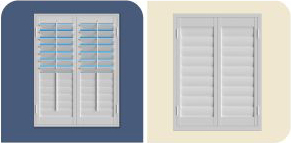
3 Ways Polywood Shutters Are Preferred Over Hollow Vinyl And Composite Shutters In Atlanta, GA
December 15, 2015
Plantation shutters in Atlanta come with different options. And when you want to know which non-wood shutter fits your home best, some differences may be tough to recognize. You can pick the wrong type without knowing and wind up ordering low quality shutters. Wondering if Polywood® shutters - our best-selling solid polymer shutters - are worth more than hollow vinyl or MDF (multi-density fiberboard) shutters? Learn about the three ways Polywood shutters are a better choice than composite shutters in Atlanta, GA so you can choose.
1. Polywood vs Composite Shutters Durability
Polywood shutters are fashioned from a first class solid polymer that ensures the most durability, rigidity, and color-retention than any other shutter available. This means the shutter louvers won't be damaged over time. On the other hand, composite shutters are built from a pressed-board core, wrapped with poly-vinyl. The vinyl encapsulating the pressed board is likely to peel off from the core material readily. And this peeling is accelerated in wet, hot, and humid environments. Non-wood shutters are also available as hollow vinyl shutters. But they disintegrate the fastest due to the substance.Both kinds of non-wood shutters are susceptible to deterioration and warping when you consider all the environmental conditions in Atlanta. Polywood is made with UV inhibitors that divert heat. And with heat being the leading offender in warping the shutter louvers, Polywood is without a doubt the highest quality plantation shutter you can buy.
2. Polywood vs Composite Shutters Color Fastness
Polywood shutters colors include three exceptional white paints. We bake our paint finishes on each part at hot temperatures that exceed any temperatures Atlanta could experience. The patented finishing process uses UV inhibitors and ensures the color will never fade.
Other types of non-wood shutters come with no or low quality paint finish. In the majority of cases, the vinyl layer is the final color. Yes, this finish appears to be adequate at first. But it fades as time goes by. And some hollow vinyls are painted. With the vinyl being a heat conductor, this negatively affects the finish over time.
3. Polywood vs Composite Shutters Energy Efficiency
Third party testing illustrates that Polywood shutters shield against 30° of temperature and reduce heat transfer by up to 45%. This means that Polywood insulates up to 70% better than even the best solid wood shutter.
Polywood’s insulating properties are a result of the solid polymer material. Yet what sets Polywood apart even more from composite shutters is the weatherstripping on the louvers and panels. Just interlock the pieces of weatherstripping while closing the panels. This gives you an airtight seal against the effects of the weather outside. No composite shutter can offer the energy savings that Polywood does.
Our Vegas Team’s First Hand Experience With The Durability Of Polywood Shutters
In 2004, Sunburst Shutters Las Vegas had Polywood shutters attached to the sides of their trucks as part of the graphics. These trucks were parked outside and sustained the weather Nevada is infamous for. That means intense heat for almost five months each year!
Those Polywood shutters had been fastened to our company trucks for at least 7 years. That’s when our team conducted an investigation on the color retention value of Polywood. So we wiped the Polywood shutter that was on the truck clean. And we compared it side by side to a new Polywood. The color hadn’t changed one bit. There wasn’t any visible signs of fading or discoloration. It was further validation for us that this paint finish is truly top quality!
And knowing that Polywood can handle so much heat and abuse travelling on a truck for over 7 years, it’s undoubtedly the strongest shutter for your residence in Atlanta, GA.


